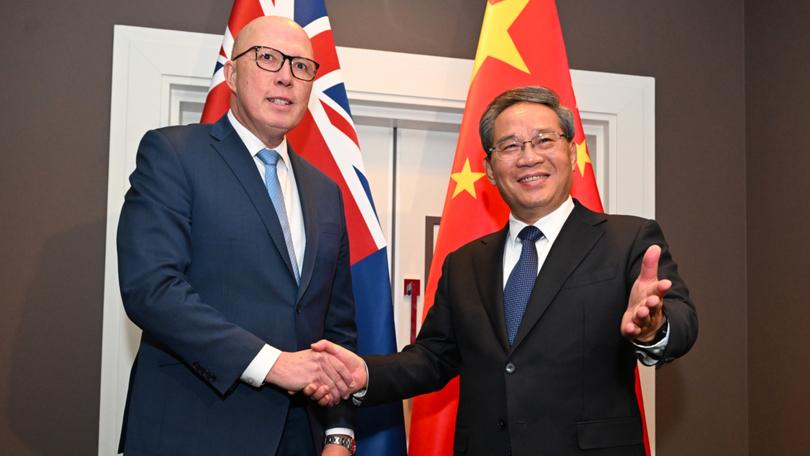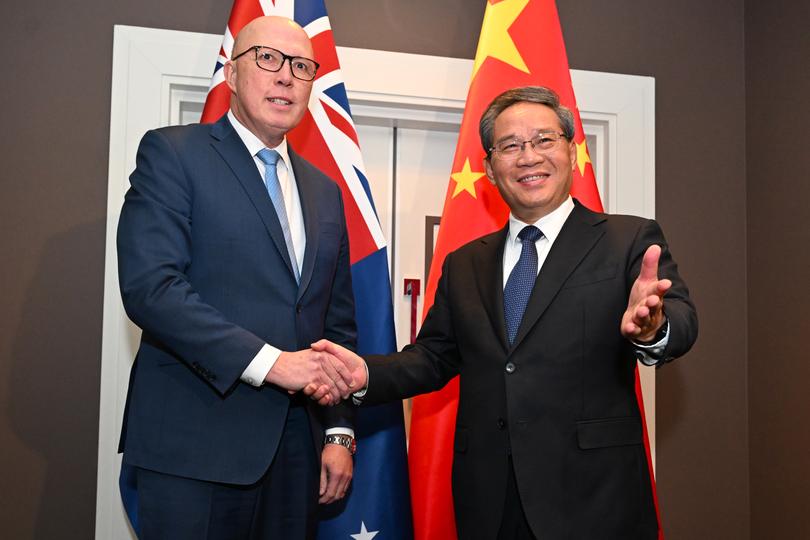Peter Dutton’s China balancing act: Opposition leader’s approach to staying friends and keeping the peace
Peter Dutton has backed the stabilisation of the bilateral relationship with Beijing but warns Australia should do all it can to deter Chinese aggression in the region.

Peter Dutton has backed the stabilisation of the bilateral relationship with Beijing and has vowed to grow ties with China if elected Prime Minister but warns Australia should do all it can to deter Chinese aggression in the region.
Mr Dutton, outlining that he did not have a stated policy when it came to Taiwan, said Australia was obligated to discourage China from making any hostile move to ensure peace prevailed.
If that failed he said: “We don’t have a (similar) position that America (has) adopted for a long period of time, and we would see the circumstances (in Taiwan) at the time (and) make a judgement.”
Sign up to The Nightly's newsletters.
Get the first look at the digital newspaper, curated daily stories and breaking headlines delivered to your inbox.
By continuing you agree to our Terms and Privacy Policy.His comments came ahead of Taiwan’s President Lai Cheng-Te urging MPs from around the world, including Australian Senators Deb O’Neill and David Fawcett, to come together to safeguard democracy.
Speaking on Tuesday, Lai Cheng-Te said Taiwan was bolstering its defences to protect democracy, warning that any confrontation in the Taiwan Strait would have far worse consequences for the world than the war in Ukraine and the COVID pandemic.
“A threat by China to any country is a threat to the whole world,” he said.
The Chinese military has increased its activity in the seas and skies around Taiwan in what is widely regarded as hostile action designed to intimidate the island, which self-rules as a democracy but is not recognised as a country.
Mr Dutton backed the public warnings of a potential conflict around 2027 – the year that Chinese President Xi Jinping has ordered his military to be ready to take Taiwan by force if necessary.
Speaking on the Bourke & Ryan podcast, Mr Dutton said Australia should be doing all it can to deter Chinese aggression in the region, including the Prime Minister attending NATO summits when invited and suggested that AUKUS and the ANZUS treaties would be a factor when considering any Australian reaction to a Chinese move against Taiwan.
Mr Dutton also sought to draw a line under how Scott Morrison dealt with China.
The former Prime Minister’s call for an inquiry into COVID angered Beijing, which retaliated by refusing to speak to the government and stunned producers with enormous tariffs on barley, wine, lobster and coal.
Since Labor came to power, Trade Minister Don Farrell has negotiated the removal of the taxes on wine and barley, which Prime Minister Anthony Albanese has hailed as a vindication of his policy to stabilise relations with China.
But China has sentenced Australian writer Yang Hengjun to death and its military has dumped flares in front of an Australian helicopter pilot and injured Australian Navy divers with underwater sonar pulses at the same time.
Asked how he would approach the relationship, Mr Dutton said he too wanted a stable one.
“Of course we want a stabilised relationship, we want a normalised relationship,” Mr Dutton said.
“We want to make sure that given China’s our biggest trading partner that we can continue to grow the relationship.
“We can be respectful, we want a strong relationship but as China is not going to compromise her national interest or her interests more generally, economically, nor should Australia be expected to.”

Mr Dutton said China’s anger towards Australia stemmed from the decision to block the Chinese telecommunications firm Huawei from supplying equipment to build the 5G network.
He said although the former government had not announced its decision “overtly,” China feared it would have a “contagion effect.”
China’s fears proved right. Australia’s Five Eyes intelligence sharing partners, the US, UK, New Zealand and Canada have all since blocked Huawei from its 5G networks.
“So that created tension. There are other points as well that you could identify over the course of the last Coalition government where it created tension,” Mr Dutton said.
But he said he would not retreat from standing up for Australia’s national interest.
“That’s the test that I would apply,” he said.
“We’re not going to compromise on our cyber security settings because we know, as the Director-General of ASIO has pointed out, Australia is under attack on a daily basis.
“It upsets China or other countries that we attribute some of those attacks to them but the fact is they’re conducting those attacks.”
Justin Bassi who served as Chief of Staff to Mr Dutton’s cabinet colleague, former foreign minister Marise Payne and is now head of the Australian Strategic Policy Institute think tank, said regional stability and stable bilateral relations were always best.
“But the reality is we have neither,” he said.
“I don’t believe we can realistically have stable relations while citizens like Yang Hengjun are arbitrarily detained, our democratic processes are undermined, including through cyber attacks and foreign interference and our defence personnel are targeted.
“Until that malign behaviour changes the job of any Australian government is to be able to do two things at once — be open to regular communication and engagement while calling out as unacceptable any malicious behaviour, specifically that which breaches international rules.”
